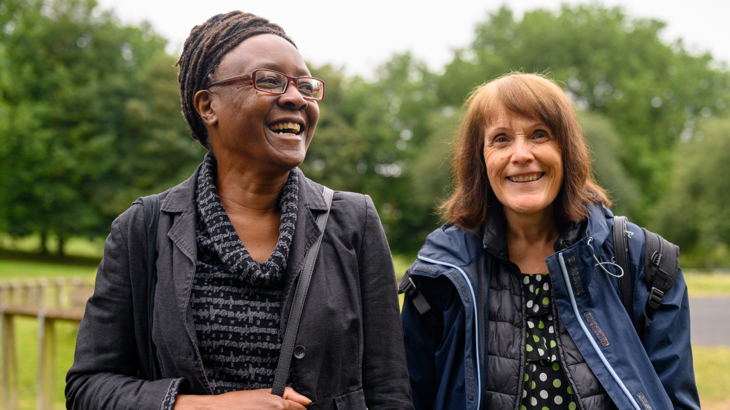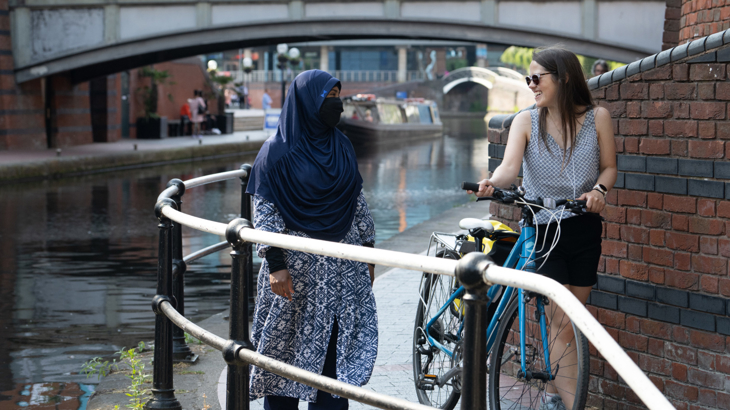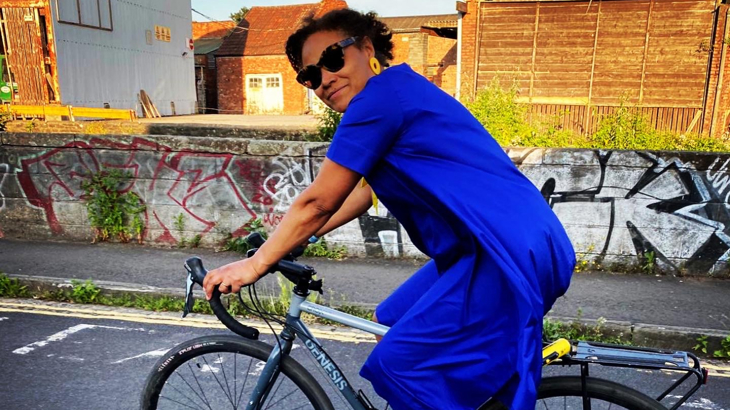To mark International Women's Day, Zoe Banks Gross, our Head of Partnerships and Public Affairs for South of England, explores how we can inspire inclusion for women and girls when it comes to public spaces and getting around. Data from our latest Walking and Cycling Index shows that only half as many women are cycling than men. In this blog, Zoe talks about how this proportion hasn’t changed for years and that we need to be putting more effort into addressing this imbalance.

This year’s International Women’s Day theme is 'inspiring inclusion'. Credit: Jon Bewley
Designing spaces with women in mind
This year’s International Women’s Day theme is 'inspiring inclusion'. To address the fact that most of our public spaces are not inclusive for everyone, we need to make fundamental changes in the way we design and use these spaces.
Women continue to be marginalised in streets and the public realm, and bringing intersectionality in, if you are disabled, come from a lower socio-economic background or are not white, you are even less likely to feel safe and welcome.
Why is this important? Because it means that women have fewer opportunities for education, fewer opportunities for work, and are less likely to use outdoor spaces for physical activity.
Improving access will not only increase women’s ability to participate economically, but will also improve health outcomes.
Our latest Index report shines a light on gender imbalances
Sustrans is celebrating 10 years of collecting data on how people move around cities across the UK and Ireland.
During this time the project has evolved from being named Bike Life, to the Walking and Cycling Index.
This March, our UK-wide report shows that only half as many women are cycling than men.
This proportion hasn’t changed for years – which shows that we need to be putting more effort into addressing this imbalance.
Being active is a privilege
We know from Sport England’s Active Lives data that men and boys are getting more physical activity than women and girls, and that when looking at people with disabilities and long-term health conditions, only 47% are getting enough activity compared to 68% of those without a disability.
Coming from a high socio-economic background means you are likely (at 73%) to be living an active life, whereas the lower group is only 53% likely to be active.
People from white British backgrounds are also more likely to be active (64%) than those from Black or Asian (55%).
Making it easy to get physical activity without additional cost or a big time investment is key to improving health outcomes for women.
In February 2024, research was published showing that women benefit more from the same amount of physical activity as men.

Data from our UK-wide Walking and Cycling Index shows that only half as many women are cycling than men. Credit: Mark Radford/Sustrans
Feeling safe is everything
Whether it is cycling, walking, wheeling, running, or playing in the park, women and girls often do not feel safe, or that these spaces are designed for them.
Make Space for Girls has carried out research into why girls don’t use parks, many don’t feel safe or that there are facilities for them.
The fear of sexual harassment is another barrier to accessing these spaces.
As I have previously taught women to cycle, as well as led Couch to 5K running groups, I have heard many stories of women wanting to be active, but the experience of being harassed while running, walking or cycling has put them off.
According to the 2023 Index data for Bristol, the proportion of women who think cycling safety is good is only 35%.
But, it's not just women who say that do not feel safe, only 37% of men think that cycling safety is good.
Better infrastructure is needed
In countries like The Netherlands, where more women cycle than men, there is a high level of infrastructure provision such as protected cycle paths and secure parking facilities.
Among Index city residents, 58% support more cycle paths along roads physically separated from traffic and pedestrians.
Our 2023 Walking and Cycling Index data for Southampton City Region also shows that 85% of residents agree more measures to reduce crime and antisocial behaviour on the street or in public spaces would improve their local area, with 82% wanting more parks and greenspaces close to their home.
Everyone benefits when more women cycle
Investing in an inclusive public realm will have a positive return on investment, especially when we consider the current benefits.
Across the three Index urban areas in the South of England (Bristol, Southampton City Region and Tower Hamlets), we estimate that cycling currently is saving the NHS £22 million, just imagine what that could be if we increased the number of women cycling.
UK-wide data coming soon
The city reports from our Walking and Cycling Index 2023, the biggest ever survey of walking, wheeling[1] and cycling across the UK and Ireland, are now live.
We've partnered with 23 cities and urban areas across the UK and Ireland to report on the progress made towards making walking, wheeling and cycling and people's attitudes around this.
The Walking and Cycling Index is the clearest picture of walking and cycling across the UK. It includes an independent and representative survey by NatCen of 18 cities and city regions, consisting of 21 thousand residents.
The UK-wide report of the Walking and Cycling Index will be released on 27 March.

Zoe has heard many stories of women wanting to be active, but the experience of being harassed while running, walking or cycling has put them off. Credit: Zoe Banks Gross
About the author
Zoe Banks Gross is passionate about social justice, sustainability and public health.
She’s the Head of Partnerships and Public Affairs for the South of England at Sustrans.
In 2014 she founded East Bristol Kidical Mass and began teaching women and kids to cycle.
Zoe wants to see more women and girls walk, wheel, run, cycle and take up space in the outdoors.
[1] We recognise that some people who use wheeled mobility aids, for example a wheelchair or a mobility scooter, may not identify with the term walking and may prefer to use the term wheeling. We use the terms walking and wheeling together to ensure we are as inclusive as possible.





